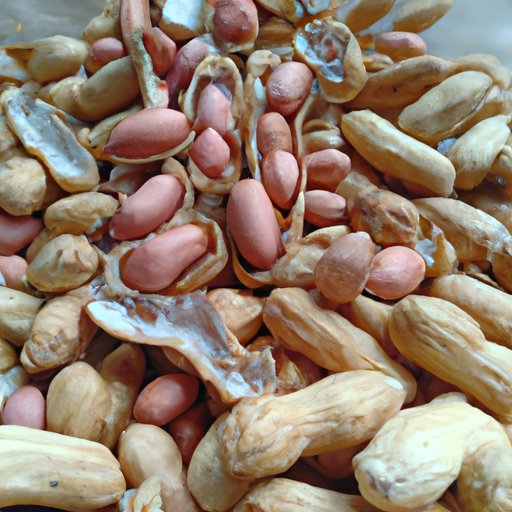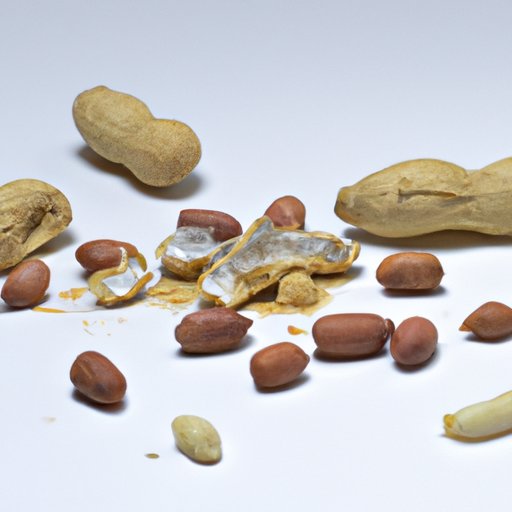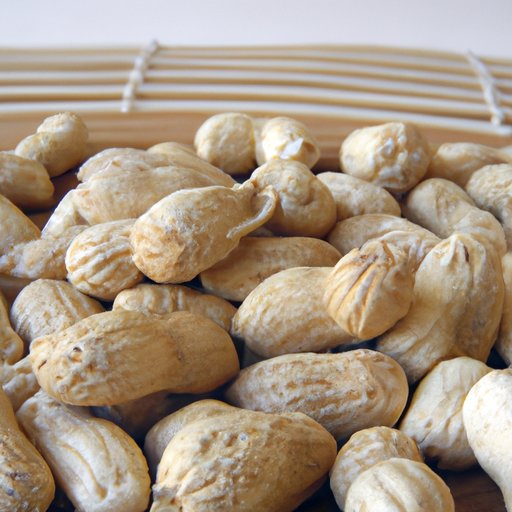Introduction
Raw peanuts are legumes that are grown in warm climates around the world. They are an inexpensive, convenient source of protein, fiber, healthy fats, vitamins, and minerals. Eating raw peanuts can be a great way to add nutrition to your diet. In this article, we will explore the potential benefits and risks associated with eating raw peanuts so you can make an informed decision about incorporating them into your diet.

Benefits of Eating Raw Peanuts
Raw peanuts offer a range of nutritional benefits, making them a great addition to any diet. Let’s take a closer look at some of the potential benefits of eating raw peanuts.
Nutritional Value
Raw peanuts are an excellent source of nutrients such as protein, fiber, healthy fats, vitamins, and minerals. A one-ounce serving (about 28 grams) of raw peanuts contains approximately:
- 7 grams of protein
- 2 grams of dietary fiber
- 14 grams of fat
- Vitamins B1, B3, E, and K
- Minerals including magnesium, phosphorus, zinc, and copper
Raw peanuts are also high in antioxidants, which can help protect the body from damage caused by free radicals. Free radicals are molecules that can cause cell damage, leading to illness and aging.
Potential Health Benefits
In addition to their nutritional value, eating raw peanuts may offer certain health benefits. Studies have shown that consuming peanuts may reduce the risk of heart disease, diabetes, and stroke. Peanuts are also thought to aid in weight loss, improve digestion, and reduce inflammation.
Potential Risks of Eating Raw Peanuts
While raw peanuts can offer a range of benefits, there are also some potential risks associated with eating them. Here are a few things to consider when deciding whether or not to incorporate raw peanuts into your diet.
Contamination
Raw peanuts can be contaminated with bacteria such as Salmonella, E. coli, and Listeria. These bacteria can cause food poisoning, which can lead to serious health problems. To reduce the risk of contamination, it is important to buy raw peanuts from a reputable source and practice proper food safety techniques.
Allergic Reactions
Some people are allergic to peanuts, and even those who are not can develop an allergy over time. Symptoms of a peanut allergy include hives, itching, swelling, difficulty breathing, and vomiting. If you experience any of these symptoms after eating raw peanuts, seek medical attention immediately.

How to Incorporate Raw Peanuts into a Healthy Diet
If you decide that raw peanuts are right for you, there are a few things you should keep in mind in order to maximize their nutritional value and minimize their potential risks.
Proper Storage
Raw peanuts should always be stored in a cool, dry place. Be sure to check the expiration date on the package before purchasing, as raw peanuts can spoil quickly. It is also important to practice proper hygiene when handling raw peanuts, as contamination is a real concern.
Moderation
It is important to eat raw peanuts in moderation. Too much of anything, even something as nutritious as raw peanuts, can be unhealthy. Aim for no more than a handful a day to reap the benefits without overdoing it.
Variety
Finally, try to mix up your nut consumption by incorporating a variety of different types of nuts into your diet. Different types of nuts offer different nutritional benefits, so varying your intake can help ensure that you are getting all the vitamins and minerals your body needs.
Conclusion
Eating raw peanuts can offer a range of nutritional benefits, but it is important to be aware of the potential risks associated with them. Contamination and allergic reactions are real concerns, so it is important to practice proper storage and handling techniques. When consumed in moderation and incorporated into a balanced diet, raw peanuts can be a great addition to your diet.
Resources
Centers for Disease Control and Prevention. (2020). Salmonella. Retrieved from https://www.cdc.gov/salmonella/index.html
Mayo Clinic. (2018). Peanuts: Heart-healthy and diabetes-friendly? Retrieved from https://www.mayoclinic.org/diseases-conditions/diabetes/expert-answers/peanuts/faq-20058271
National Peanut Board. (n.d.). Nutritional Facts. Retrieved from http://nationalpeanutboard.
(Note: Is this article not meeting your expectations? Do you have knowledge or insights to share? Unlock new opportunities and expand your reach by joining our authors team. Click Registration to join us and share your expertise with our readers.)
